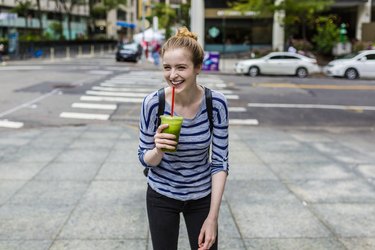
There are a variety of ingredients that can deliver an energy boost when you need it — and a variety of ways to get them. In addition to energy drinks, these ingredients can be found in many foods and other beverages, some of them familiar and some unexpected — milk, for example. Here's a quick breakdown of some of the most common energy-boosting ingredients, and natural sources for each.
Active Ingredient: Caffeine
Video of the Day
Natural Source: Coffee or matcha
Coffee and matcha, plain and unsweetened, offer caffeine without added synthetic vitamins or sugar. Plus, there's more caffeine in the average mug of joe, ounce for ounce, than you'll find in most energy drinks. A single cup of the bean-based brew has about 94 milligrams of caffeine, according to the U.S. Department of Agriculture (USDA), while energy drinks have about 74 milligrams, per the USDA.
Video of the Day
To jazz up your java without adding excess sugar or calories, add a splash of milk, sprinkle of stevia or dash of cinnamon.
Read more: 5 Unexpected Benefits of Drinking Matcha Tea
Active Ingredient: Taurine
Natural Source: Milk (really!)
The amino acid taurine is known for promoting immune system health, but it's not often lauded for its energy-boosting properties. The molecule has been linked to other health benefits, as well. It may help reduce cholesterol and blood pressure, which can lower your risk for heart disease, according to a review published January 2014 in Amino Acids. And it may also improve athletic performance, per a February 2013 study in the same journal, although more research is needed in this area.
In addition to cow's milk, taurine is also found meat, fish, and other dairy products.
Active Ingredient: B Vitamins
Natural Source: Green juice
Green juice is a blended drink that can be made with any variety of vitamin-rich vegetables — such as kale, spinach, celery, parsley, sprouts and cucumbers — and often with a healthy fruit, like lemon or green apple, thrown in for flavor. Made with the right ingredients, green juice is an excellent source of B-complex vitamins, which provide a host of health benefits on top of increased energy.
Active Ingredient: Ginseng
Natural Source: Ginseng tea
Ginseng, a medicinal herb that grows in the mountains of China and North America, is believed to improve alertness and energy levels in addition to other potential health benefits. Ginseng is sold in several different forms, including pills, powder for making tea, and the herb in its natural form.
Note: Ginseng has numerous potential side effects, according to the Cleveland Clinic, and should be used with the guidance of a health care provider.
Active Ingredient: Guarana
Natural source: Steaz green tea drinks
Guarana contains antioxidants and aids in better blood flow throughout the body, which can make you feel more alert, says Maggie Michalczyk, RD, a Chicago-based registered dietitian and recipe developer.
The Steaz brand of beverages contain green tea, yerba matte and guarana extract for an energy kick without many of the other unnecessary ingredients found in some energy drinks.
"I especially like Steaz's unsweetened and lightly sweetened products because they contain less sugar than an average energy drink, and no artificial sugar," says Michalczyk.
- Journal of the American Heart Association: "Impact of High Volume Energy Drink Consumption on Electrocardiographic and Blood Pressure Parameters: A Randomized Trial"
- USDA FoodData Central: "Beverages, coffee, brewed, prepared with tap water"
- USDA FoodData Central: "Beverages, Energy drink, AMP"
- Amino Acids: "Taurine and atherosclerosis."
- Amino Acids: "The effect of acute taurine ingestion on 3-km running performance in trained middle-distance runners."
- National Center or Complementary and Integrative Health: "Asian Ginseng"
- Once Upon a Pumpkin: "Meet Maggie"
- Cleveland Clinic: Can Ginseng Boost Your Health?